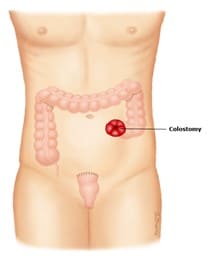An ileostomy is an opening in the belly made by a doctor as a way for waste products from the intestines to leave the body.
 An ileostomy is sometimes called a “stoma,” which is a medical word that means “opening.” After you have an ileostomy made, waste products from your intestines will come out through the stoma into a bag that is attached to your skin.
An ileostomy is sometimes called a “stoma,” which is a medical word that means “opening.” After you have an ileostomy made, waste products from your intestines will come out through the stoma into a bag that is attached to your skin.
A special nurse (called an ostomy nurse) will teach you how to take care of your ileostomy. They will teach you:
- When and how to empty the bag
- When and how to put on a new bag
- How to check your stoma for problems
There are different types of ileostomy bags that people can use. With some types of bags, you empty, clean, and reuse them. With other types, you throw them out after each use.
You might worry that your bag will leak, or that other people will be able to smell your bowel movements. But these things rarely happen. The bags are made so that they do not leak or smell.
Some people have a certain type of ileostomy. They don’t use a bag to collect their bowel movements. Instead, they have an internal pouch made out of intestine, which they drain through the stoma a few times a day.
Different problems can happen with an ileostomy, either right away or years later. Let your doctor or nurse know if you have any of the following symptoms or problems:
- Your stoma starts turning purple or black instead of pink.
- Your stoma is swollen or larger than usual or you have a bulge to the side of the stoma.
- Your stoma is smaller than usual.
- Your stoma leaks more than usual.
- You have a rash or sores around your stoma.
- You have diarrhea.
- You have sudden belly pain, cramps, or nausea.
- You are dehydrated. Dehydration is when the body loses too much water. Symptoms of dehydration include not making as much urine or having dark yellow urine, or feeling thirsty, tired, dizzy, or confused.
- You haven’t passed gas waste from your stoma for 4 to 6 hours (during the day). These symptoms could mean that your stoma is blocked.
When people have an ileostomy, their body doesn’t always absorb medicines normally. Because of this, try to use liquid medicines instead of pills. Do not take pills labeled “enteric coated,” “time release,” or “extended release.” Your body might not absorb these types of pills well.
Yes. When people have an ileostomy, their body doesn’t always absorb water, vitamins, and salts normally. Because of this, you should drink plenty of fluids to avoid getting dehydrated.
You should avoid eating foods that could easily block your intestine or stoma. Some of these foods include popcorn, mushrooms, dried fruit, and fruits or vegetables with skin.
The foods you eat can also affect the odor of your bowel movements, and how solid or loose they are. Certain foods can also make you have more gas. These are listed in the table.
Foods that can affect bowel movements and gas
|
|
|
|
You should be able to live an active and normal life with your ileostomy. But many people worry about the following things:
- Clothes – You do not need to wear special clothes. Other people won’t be able to see your bag under your clothes.
- Baths and showers – You can take a bath or shower with or without your bag on.
- Sports – You will probably be able to play most sports. You might want to wear a special belt to protect your bag and keep it in place. Doctors usually recommend that people with an ileostomy not play certain contact sports (such as football) or sports that involve straining, such as lifting weights.
- Swimming – You can swim with your bag on. Make sure to empty your bag before you swim.
- Sex – You can have sex. But you might want to wear a special wrap to protect (and cover) your bag during sex.
- Travel – When you travel, be sure to bring extra supplies for your ileostomy. If you fly, take your supplies in your carry-on luggage.
It is normal to feed sad, upset, or worried when you have an ileostomy. If you have these feelings, try to get help. You can talk with a family member, friend, or counselor. You might also find it helpful to go to a support group for people with an ileostomy.




